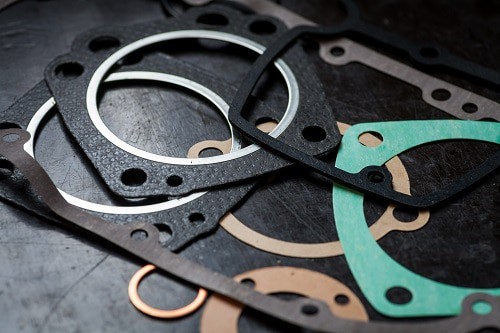A gasket is a precise seal made of metal or rubber that prevents fluids or gases from escaping a sealed system and blocks contaminants from entering. Gaskets create a mechanical seal between the mating surfaces of two components and come in many sizes, shapes, and material compositions. They can fit a variety of applications and be custom-made for specialized purposes.
At Fournier Rubber & Supply Company, we manufacture a wide range of rubber gaskets for high-performance applications. Since 1933, we have been delivering superior quality rubber products to our customers in critical industries, including the medical and aerospace markets. These applications require rubber gaskets to meet exacting specifications and withstand harsh conditions. Choosing the right material and type of gasket requires careful consideration of the application’s operating conditions and partnering with the right supplier.
What to Consider When Choosing Your Gasket Material and Type
When selecting a gasket for an application, consider the material and type of gasket you require. Different gasket materials can withstand different pressures, temperatures, and other factors, such as moisture, chemicals, and oxidation. Gaskets come in a wide range of styles, thicknesses, and dimensions. Their mechanical strength, longevity, and flexibility will also influence their efficacy in a given environment.
Choosing a type of gasket or material that is not suited for its intended application or environment can result in the early failure of the gasket. If the failure is severe enough, it can even result in unforeseen and costly equipment downtime.
Metal Gaskets
Metal gaskets are preferred for extreme pressure applications. They have either an ovular or octagonal cross-section, with the octagonal option offering higher strength to withstand high pressures. Metal gaskets form a tight connection between two contact points to contain high-pressure fluids. Secured with a high-tension bolt, they are commonly found in industrial systems or oil and gas applications.
Metal gaskets come in the following material options:
- Stainless steel
- Low carbon steel
- Monel
- Inconel
Rubber Gaskets
Rubber sealing gaskets are made of soft materials and are compressed between two surfaces in low pressure or low tension applications. They are best for preventing leaks in low-pressure fluid sealing settings. Rubber gaskets are easily manufactured, affordable, and versatile enough to meet diverse specifications.
The following rubber gasket materials are the most popular:
- Silicone
- EPDM
- Chloroprene/Neoprene
Silicone Gaskets
Silicone gaskets are flexible and durable, able to resist water, UV exposure, corrosion, extreme temperatures, and ozone. Solid silicone gaskets create a lasting seal between metal surfaces. They also come in foam and sponge forms to create a seal in applications with minimal pressure. Silicone gaskets will not shrink or become brittle due to temperature changes. They are chemically inert and non-toxic, making them ideal for food and medical applications.
Silicone gaskets are often in outdoor settings as well as healthcare, consumer product, electronics, construction, and aerospace applications.
EPDM Gaskets
Ethylene propylene diene monomer (EPDM) is a durable and flexible synthetic rubber. Its cross-linked structure provides exceptional stability, strength, and elasticity. EPDM gaskets can resist extreme temperatures, UV rays, ozone, and water.
EPDM gaskets are popular in various industries, including appliances, transportation, aerospace, construction, energy, marine, automotive, medical, and electrical.
Neoprene (Chloroprene) Gaskets
Neoprene is the proprietary name of chloroprene, a rubber known for its thermal stability, strength, and resistance to water, chemicals, and corrosion. Chloroprene gaskets are versatile, lightweight, and compressible, forming a high-quality seal. They are an ideal choice for the oil and petroleum industry, where they can withstand harsh environments and petroleum-based solvents.
Semi-Metallic or Composite Gaskets
Composite gaskets are made of metallic and nonmetallic materials to deliver unique properties. Various configurations—such as in tongue/groove, raised face, and male-female flanges—allow composite gaskets to fit a wide range of temperature and pressure conditions.
Some of the most common composite gaskets include:
- Spiral wound
- Metal jacketed
- Kammprofile
Types of Gaskets
After selecting the ideal gasket material, it is vital to choose the type of gasket that best suits your application.
Jacketed Gaskets
Jacketed gaskets have a metallic coating or jacket surrounding a soft nonmetallic interior. They come in options such as single-sided, double-sided, and corrugated jacketing. The jacket provides greater resistance against blowouts for high-pressure and high-heat applications, including pipe flange connections, heat exchangers, and heavy-duty exhausts.
Rubber Sheet Material Gaskets
Rubber sheet material gaskets are cut or punched from a sheet of industrial rubber material. They typically provide adequate sealing for moderate temperatures and can be adapted to a variety of applications.
Spiral Wound Gaskets
Spiral wound gaskets are formed by winding a metallic and nonmetallic material together in a spiral, which enhances flexibility and durability. These gaskets can also tolerate a greater range of operating conditions, recover quickly, and accommodate flange surface irregularities. Because they can withstand vibration, shock, and pressure and temperature fluctuations, spiral wound gaskets are ideal for pipes and pump systems.
Kammprofile Gaskets
Kammprofile gaskets consist of a metal core with a nonmetallic outer layer. The metal provides reinforcement, while the nonmetallic material allows the gasket to form a tight seal. These gaskets protect flanges from damage during operation and are preferred for applications in the oil and gas, water treatment, mining, fertilizer, and piping industries.
How to Choose the Right Gasket Supplier
Choosing the right gasket supplier is vital to the success of your application. Buyers should evaluate the gasket supplier’s experience in their specific industry. They should also review the supplier’s design, inspection, testing, and production run capabilities. Researching the supplier’s full capabilities ensures a high-quality, reliable final product delivery.
Rubber Gaskets From Fournier Rubber & Supply Company
There is a wide variety of rubber gasket materials and types, which can be difficult to choose from without expert guidance. While metal gaskets are often used for high-pressure and high-temperature applications, rubber gaskets can cost-effectively provide reliable performance in moderate pressure and temperature applications.
As a leading rubber gasket manufacturer, Fournier Rubber & Supply Company can help you choose the right standard rubber gasket seals or design a custom solution for your needs. With nearly 100 years in the rubber business, we have the experience necessary to deliver the best rubber gaskets for your application. We have worked with clients in various industries, including the aerospace, appliance, construction, and medical fields. View our rubber gaskets page for more information, or request a quote to start your project today.
Ready to discuss your project?
Our team is here to help — reach out now if you have questions about our products, or would like to place an order.
Reach Out Today




